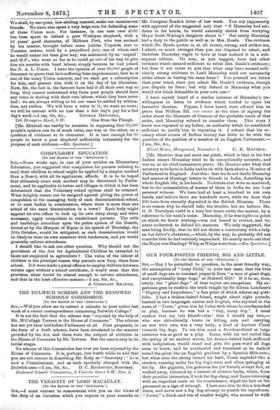THE VERACITY OF LORD MACAULAY.
[TO THE EDITOR OF TEl "SPEOTATOR.1
Sla,—I must venture to remonstrate with you on the views of the duty of, an historian which you express in your remarks on Mr. Compton Reade's letter of last week. You say (apparently with approval of the suggested act) that "if Macaulay had evi- dence in his hands, he would naturally shrink from worrying Major Scott-Waring's daughter about it." But surely Macaulay had a duty to the public as well as to Mrs. Reade. The evidence which Mr. Reads quotes is, at all events, strong, and strikes me, I admit, as much stronger than you are disposed to admit, and therefore Macaulay ought to have at least noticed it in a sub- sequent edition. He may, as you suggest, have had other evidence which seemed sufficient to rebut Mrs. Reade's evidence ; but does it not occur to you that what may have seemed suffi- ciently strong evidence to Lord Macaulay need not necessarily strike others as having the same force ? You yourself are better than your creed, since you admit Mr. Reade's evidence, though you dispute its force ; but why defend in Macaulay what you would not think defensible in your own case ?
I have myself heard of a similar instance of Macaulay's un- willingness to listen to evidence which tended to upset his favourite theories. Papers, I have heard, were offered him to prove that William III. was aware at the time of signing the order about the Massacre of Glencoe of the probable result of that order, and Macaulay refused to consider them. This story I know was repeated to my father, on authority which he considered sufficient to justify him in repeating it. I submit that his ac. curacy about events of Indian history has little to do with the question of the position of a member of an English Parliament.— I am, Sir, &c., Eland House, Hampstead, November 1. C. E. MAIIRiCE.
[Mr. Maurice does not meet our point, which is that in his two Indian essays Macaulay tried to be exceptionally accurate, and was so, as we cited instances to prove. Mr. Maurice asks what that accuracy as to facts in India had to do with facts about a Member of Parliament in England. Just this : that we do not doubt Macaulay had masses of Hastings' letters to friends in India, describing his whole English life, in his hands. No letters ever were so scattered, but to the accumulation of masses of them in India we can bear personal witness. We have had at least a hundred in our own hands, and believe there are hundreds more, while we hear that 200 have been recently deposited in the British Museum. There is no reason why he should take the trouble, but we believe Mr. G. 0. Trevelyan could in a very few hours settle the matter, by a reference to his uncle's notes. Macaulay, if he was right—a point on which we know nothing—was not bound to retract, and we never undertook to defend his manners. We only suggested, the man being kindly, that he did not desire a controversy with a lady on her father's character,—which, by the way, he probably did not consider that he had seriously impeached. He merely made out that the Major was Hastings' Whip as Whips were then.—En. Spectator.]


































 Previous page
Previous page